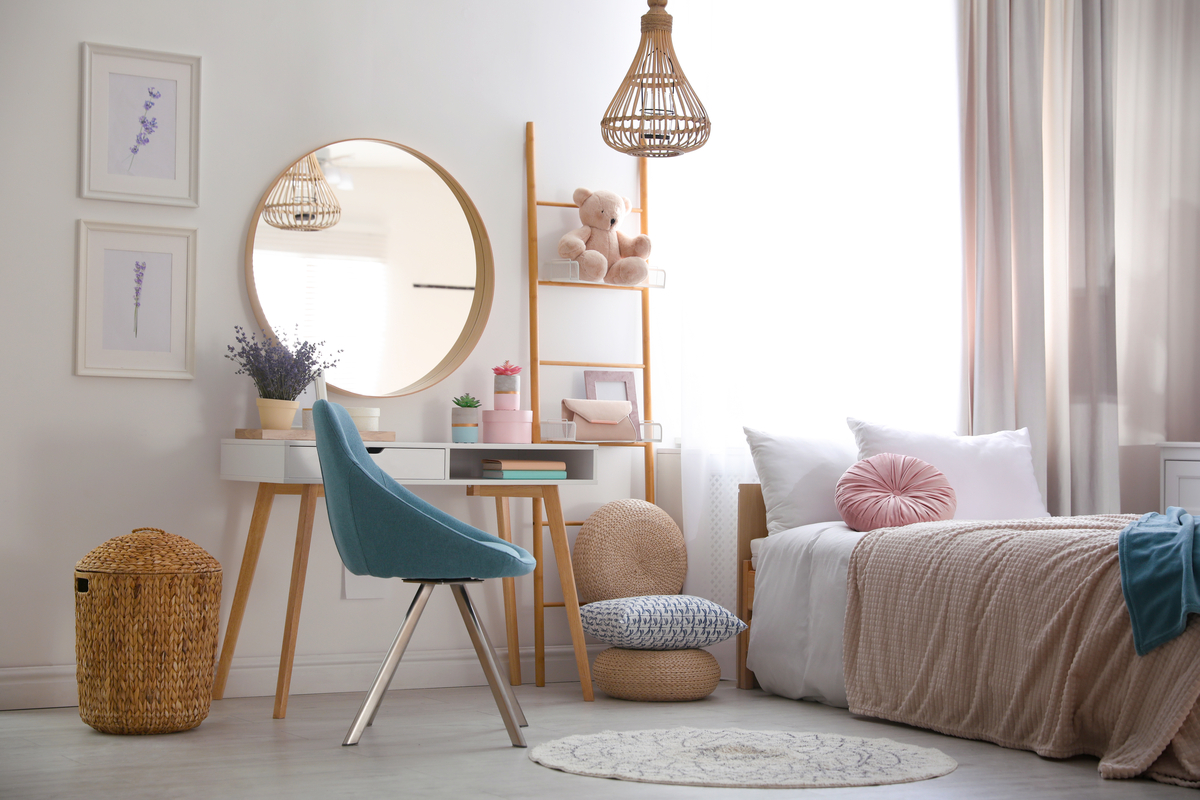
Creating a well-designed and functional bedroom for a teenager is a great way to provide them with a space that reflects their personality and interests while also serving their needs. They might desire trendy handles for barn doors for the door to their bedroom. Maybe they have a certain color of bedroom in mind. Ask them their ideas. Here are several ideas to incorporate in a teen’s bedroom that will make it stylish, comfortable, and functional:
- Color scheme: Choose a color scheme that suits your teen’s taste and creates a pleasant atmosphere. Consider using a combination of bold and neutral colors or opt for a monochromatic scheme for a modern look. Ensure the colors complement each other and create a cohesive feel throughout the room.
- Wall décor: Walls are a blank canvas for personal expression. Hang posters, artwork, or photographs that reflect your teen’s interests, hobbies, or inspirations. Consider using removable wall decals or a magnetic board to easily switch up the display.
- Functional furniture: Invest in furniture pieces that maximize storage and functionality. A bed with built-in drawers or a loft bed with a desk underneath can save space and provide storage options. Include a comfortable chair or bean bag for lounging and a desk or study area for homework and creative activities.
- Organizational systems: Encourage tidiness and organization by incorporating storage solutions. Install shelves, bookcases, or cubbies to keep books, collectibles, or art supplies in order. Use baskets, bins, or drawer organizers to keep smaller items organized and easily accessible.
- Study area: Dedicate a specific area for studying and completing schoolwork. A desk with a comfortable chair, good lighting, and storage compartments will help create a productive environment. Add a bulletin board or whiteboard to keep track of important deadlines and notes.
- Technology integration: As technology is an essential part of a teenager’s life, incorporate charging stations, cable management systems, and adequate outlets near the desk and bed. Consider installing a small TV or a music system to enjoy entertainment in the room.
- Lighting: Ensure the room has a variety of lighting options to cater to different needs and moods. Install overhead lighting for general illumination, task lighting for the study area, and ambient lighting such as string lights or floor lamps to create a cozy and relaxing atmosphere.
- Comfortable bedding: Choose bedding that is not only stylish but also comfortable. Provide a variety of pillows, cushions, and blankets to create a cozy and inviting space. Let your teen have a say in selecting patterns and textures that reflect their personal style.
- Personalized touches: Incorporate personalized elements that reflect your teen’s interests and hobbies. It could be a wall gallery of their favorite photos, a bulletin board for pinning memories, or a display shelf for trophies or awards. These personalized touches will make the room feel uniquely theirs.
- Privacy and relaxation: Create a space where your teen can relax and unwind. Consider adding blackout curtains or blinds to ensure privacy and promote better sleep. Provide a comfortable reading nook with a cozy chair and a small bookshelf for leisurely reading.
- Versatile seating: Incorporate versatile seating options, such as a futon or a bean bag chair, for lounging and socializing with friends. These flexible seating options can be rearranged to accommodate different activities or provide additional sleeping space for overnight guests.
- Reflective mirrors: Use mirrors strategically to make the room appear larger and brighter. Consider placing a full-length mirror on a closet door or adding a decorative mirror to enhance the room’s aesthetics while also serving a functional purpose.
- Greenery: Introduce plants or flowers to bring a touch of nature into the room. Low-maintenance plants like succulents or hanging plants can add freshness and purify the air. Ensure they receive adequate light and care.
- Acoustic elements: Incorporate acoustic panels or curtains to reduce noise and create a more peaceful environment. This is especially beneficial if your teen enjoys playing music or needs a quiet space for studying.
- Safety considerations: Ensure the room meets safety standards. Install smoke detectors, check electrical outlets for any issues, and secure heavy furniture to prevent tipping accidents. Use flame-retardant materials where possible and choose bedding and curtains that meet fire safety regulations.
By implementing these ideas, you can create a functional and aesthetically pleasing bedroom that reflects your teenager’s unique personality, provides a comfortable space for relaxation, studying, and socializing, and meets their needs for privacy, organization, and personal expression.

